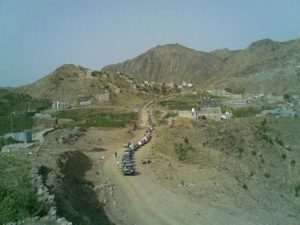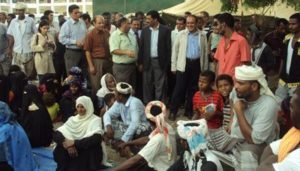 With the worst power and fuel crisis of its history, Yemen’s already shaken economy is being pushed towards the edge of a precipice. With the majority of its people living on less than $2 per day, Yemenis are struggling to make do.
With the worst power and fuel crisis of its history, Yemen’s already shaken economy is being pushed towards the edge of a precipice. With the majority of its people living on less than $2 per day, Yemenis are struggling to make do.
Over the past few weeks, food prices have skyrocketed, forcing families to cut on other basics such as health and education. Many stomachs are now going hungry across Yemen, putting more strain on the most vulnerable: children and elderly.
The World fails to realize how desperate the situation has become in the poorest country of the Arabic Peninsula. With almost no running water in most areas and the price of potable water becoming a faraway dream, many families are forced to drink from stagnant and often harmful sources. With temperatures approaching well over 35 degrees Yemen is a step away from an epidemic. Medics have already reported cases of cholera amongst the displaced families of the Abyan province.
To make matters worse, the UN World Food Program’s Yemen mission (WFP) is facing an important funding crisis. On its latest press release the WFP said: “Yemen is entering a serious humanitarian crisis. UN presence in the country is essential, both to provide relief during the ongoing political and economic emergency, as well as to ensure operational continuity.”
Before the Revolution even started, Yemen was already on shaky ground, requiring intervention from neighboring countries and NGOs. Now in the midst of a never-ending Revolution and tribal conflicts brewing in the provinces, Yemen will need to be reconstructed from the ground up.
Just as the northern province of Sa’ada is slowly mopping up years of ongoing conflicts with the government, the villages of Arhab and Naham are now under constant shelling from the Republican Guards, forcing hundreds to find refuge in the mountains.
For well over a month now, Zinjibar and Jaar have been the scene of violent clashes opposing armed militants allegedly linked to al-Qaeda and the Yemeni army. Thousands upon thousands of families fled the area, fearing more airstrikes and killings.
In the North alone, the WFP is planning on feeding at least 416,800 IDPs and war-affected persons, amongst whom 119,100 are children under 5. But with a deficit of $34 Million for its “Food Assistance to Conflict-Affected Persons in Northern Yemen” program, help might yet be a long way away; add to that a pandemic lack of fuel, Yemen is truly on its last leg.
Although UNICEF has somehow stepped in to fill the void left by the WFP, all specialists agree that it is not nearly enough. Geert Cappeleare said to the press: “There is definitely a new window of opportunity for providing assistance in areas which have been for some time inaccessible.”
 The WFP is now trying to relief the southern part of Yemen by distributing food rations to some 2500 families, while gearing up for more arrivals. But with so little funding one can only do so much. Recently, the WFP school feeding program was suspended entirely.
The WFP is now trying to relief the southern part of Yemen by distributing food rations to some 2500 families, while gearing up for more arrivals. But with so little funding one can only do so much. Recently, the WFP school feeding program was suspended entirely.
It is evident that without the help of the international community Yemen will face a humanitarian crisis of biblical proportion. Cash needs to be urgently redirected towards the most basic needs: water, food, fuel and medication.
The world cannot afford a famine in Yemen as it would lead to more violence. Starve for cash, the tribes will certainly use kidnapping of foreigners and piracy as a mean to generate income. Given that 3 million barrels of crude oil travel through Yemen every day, it could potentially lead to a major disruption of the oil route.